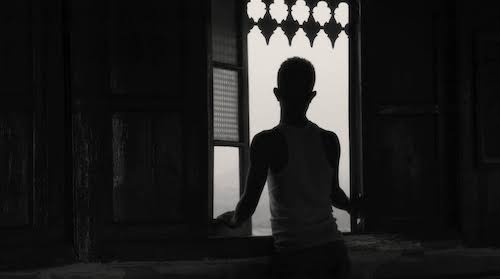Communiqué
Enter a world in Ethiopia where khat, a euphoria-inducing plant, holds sway, “Faya Dayi” on POV – August 29 at 9 pm
< < Back to enter-a-world-in-ethiopia-where-khat-a-euphoria-inducing-plant-holds-sway-faya-dayi-on-pov-august-29-at-9-pm‘POV’ Presents Award-Winning Faya Dayi, Intimate Look At How Geo-Political, Economic and Climate Forces are Shaping a Generation of Ethiopians
Monday, August 29 at 9 pm
POV, America’s longest running documentary series, currently celebrating its 35th anniversary season, will present Faya Dayi in its national broadcast premiere on Monday, August 29, 2022. The film, directed, produced and filmed by Jessica Beshir, is a hypnotic immersion in the world of Harar, Ethiopia, a place where one commodity – khat, a euphoria-inducing plant – holds sway over the rituals and rhythms of everyday life. After its broadcast premiere date, Faya Dayi will be available to stream free until September 29, 2022 at pbs.org, and the PBS Video app.

Credit: courtesy Feyatey LLC
Faya Dayi, which was named to the 94th Academy Awards® shortlist for documentary feature, captures intimate moments in the lives of everyone from the harvesters of the crop to people lost in its narcotic haze, to a desperate but determined younger generation searching for an escape from political strife. Other accolades include Film Independent Spirit Awards win for Truer Than Fiction; Gotham Independent Film Awards nomination for Best Documentary; five Cinema Eye Honors Awards nominations for Outstanding Achievement in Direction, Debut Feature Film, Non Fiction Feature Filmmaking, Cinematography and Sound Design; and two Critics’ Choice Documentary Awards nominations for Best First Documentary Feature and Best Cinematography. Executive producers are Tony Hsieh, Roberto Grande, Mimi Pham, Bryn Mooser, and Kathryn Everett for XTR; Rhianon Jones for Neon Heart Productions; Matthew Petock, Daniel Patrick Carbone, and Zachary Shedd for Flies Collective; and Erika Dilday and Chris White for American Documentary | POV.
A film ten years in the making, Faya Dayi was conceived by Beshir as an act of reconnecting with the Ethiopian homeland she left at the age of sixteen, when her family fled to Mexico to escape the chaos and oppression of the Mengistu and Derg political regimes. In 2011, during one of her return trips to Ethiopia, Beshir began collecting observations and impressions of the country by shooting footage that told the stories of several Ethiopians and the social, religious, and economic forces influencing their lives, including the ascendency of khat as a national cash crop. A plant with hallucinatory properties that has been traditionally harvested and chewed for ritualistic purposes, khat was, in Beshir’s youth, one of many lucrative crops bolstering the Ethiopian economy.

Credit: courtesy Feyatey LLC
But in the intervening years, climate change and politics have forced farmers to grow khat to the near exclusion of all other plants. And its excessive presence in the country has increased recreational khat usage among the younger generations who use it to soften the edges of cumulative years spent experiencing war, unemployment, and a lack of freedom of expression.
In Faya Dayi, the Mexican-Ethiopian filmmaker offers an exciting revitalization to the ‘Third Cinema,’ the influential aesthetic and political cinematic movement that emerged in the late sixties and early seventies that decried neocolonialism and capitalism. The transcontinental movement created powerful creative connections between Latin America and Africa through the work of celebrated directors such as Fernando Solanas, Jorge Sanjinés, and Ousmane Sembène, which have influenced Beshir’s own artistic practice.
“I am interested in transmitting experiences that reflect the complex struggles people in my hometown are presently encountering. Through an inner gaze that above all honors the dignity of people, the film opens a space for us to consider the effects of political violence on our youth whom we continue to lose to dangerous migrations. I’m incredibly appreciative of the way in which POV champions voices that have been historically underrepresented, and I couldn’t be happier to have Faya Dayi’s television premiere on POV,” said Faya Dayi director/producer Jessica Beshir.

